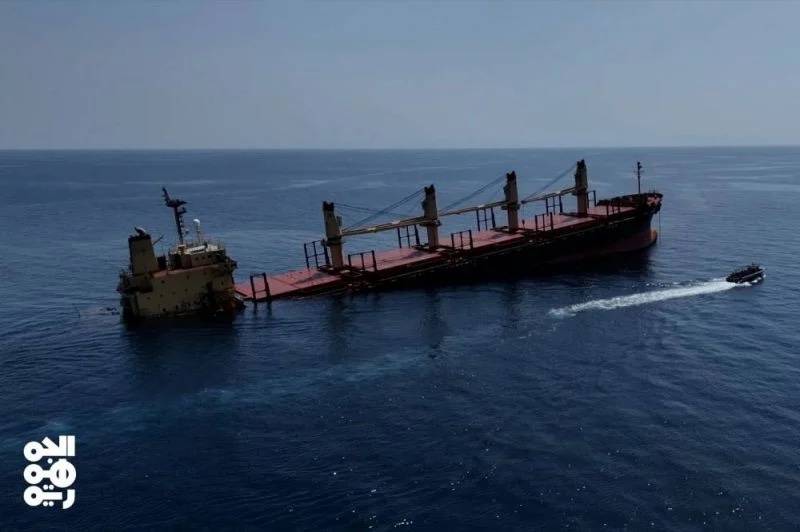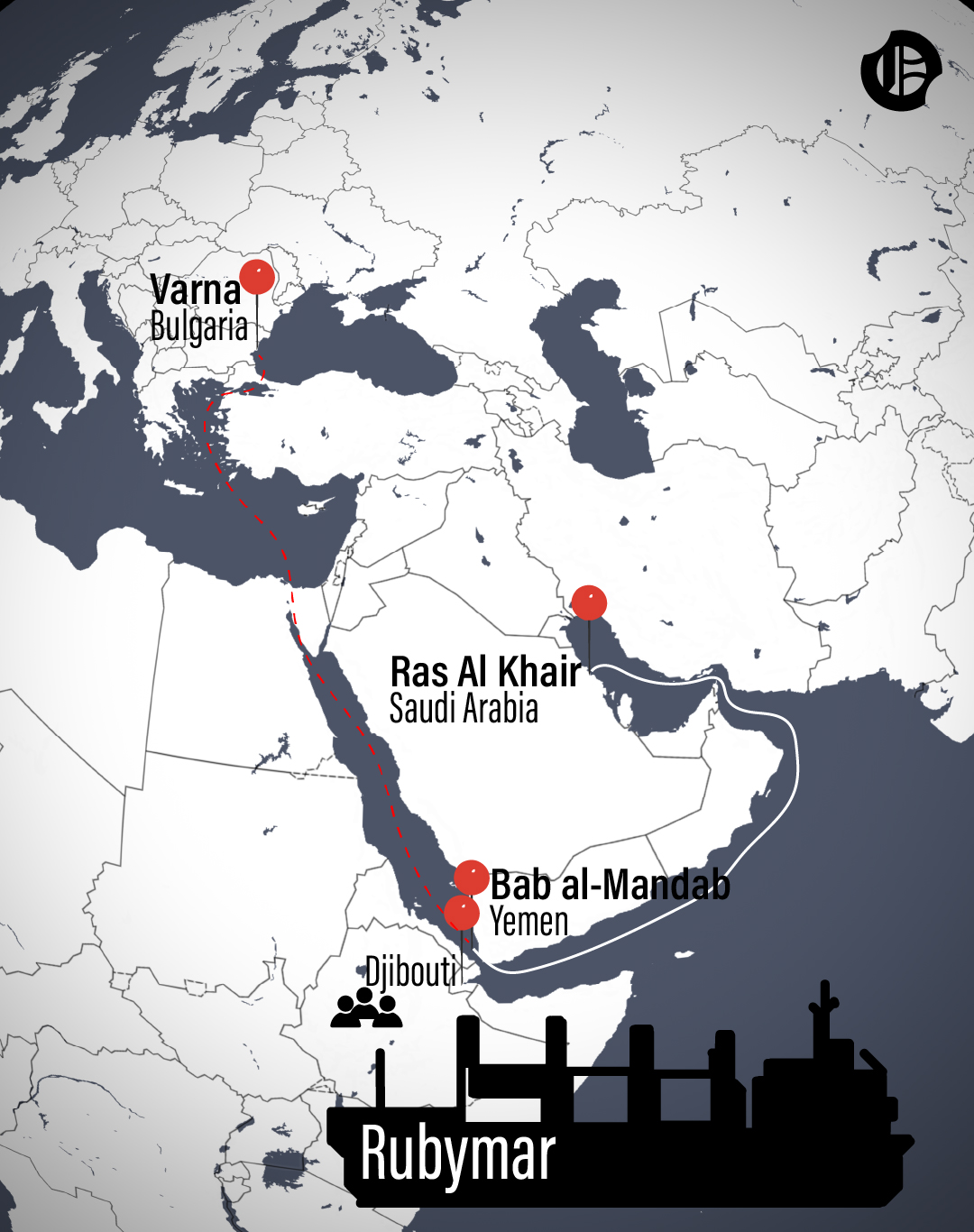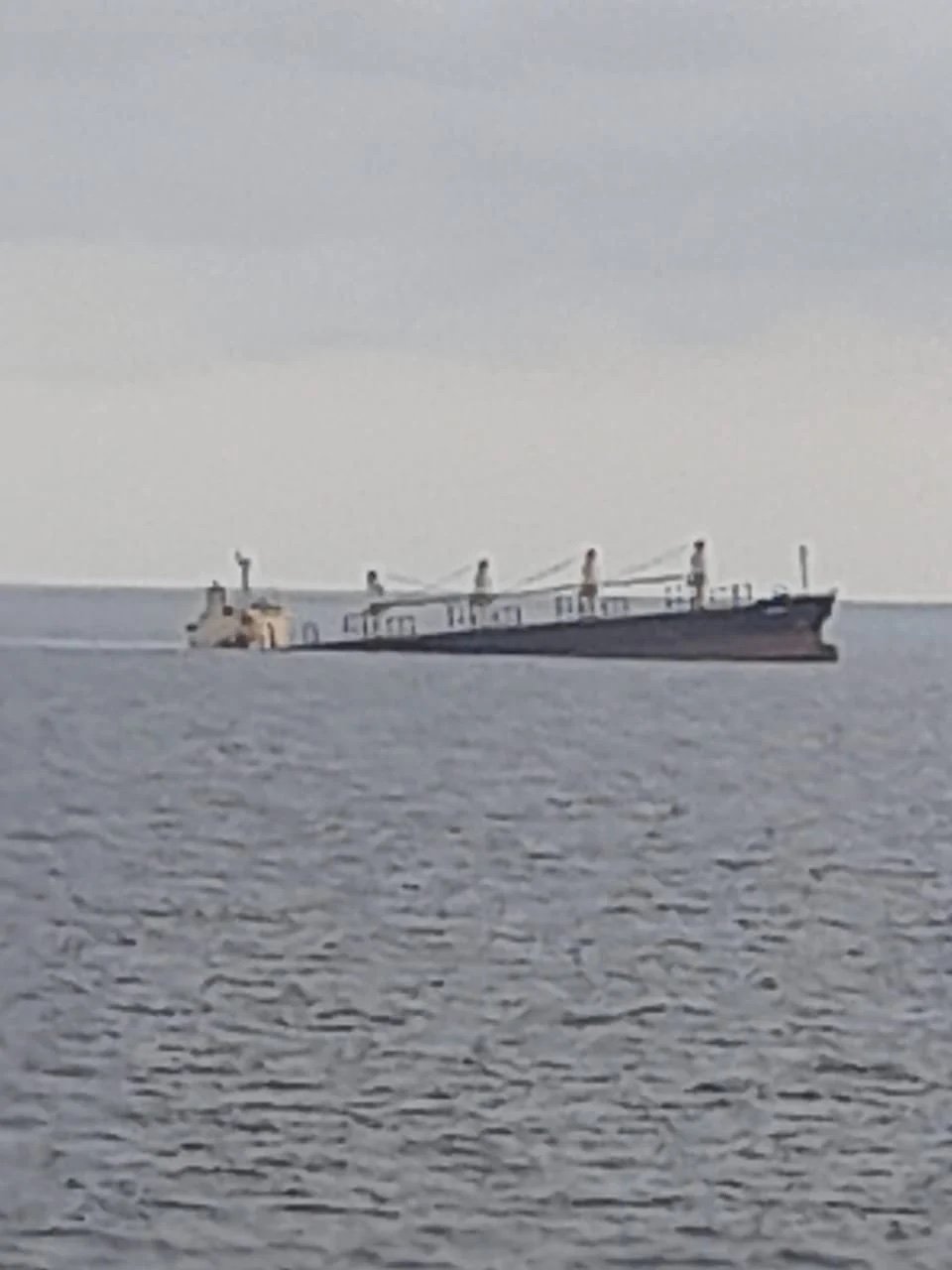
The Rubymar cargo ship sinking off the Yemeni coast on Feb. 26, 2024 following a Houthi missile attack. (Credit: AL-Joumhouriya TV/AFP)
Lebanese-operated cargo ship the Rubymar, which was abandoned in the southern Red Sea after being targeted by Yemen's Houthi rebels on Feb. 18, has "sunk," the internationally recognized Yemeni government said on Saturday, cited by Reuters.
On Feb. 18, Houthi missile fire hit the Rubymar in the Gulf of Aden off the coast of Yemen, making it the first Lebanese-operated vessel to be targeted in the Red Sea since the start of the war in Gaza. Yemen's Houthi rebels, who have been attacking commercial vessels in the Red Sea in solidarity with Palestinians in Gaza since the start of the war between Hamas and Israel, claimed responsibility. When the ship took on water without sinking, the crew, unharmed, abandoned it.
Roy Khoury, CEO of the Lebanese operating company Blue Fleet, told L'Orient-Le Jour that he had "no details on the fate of the bulk carrier," but warnings of the environmental risk posed by its sinking have multiplied. Already on Feb. 24, the US military command for the Middle East (CENTCOM) warned of an "environmental catastrophe" if the Rubymar's cargo, which contained "41,000 tons of fertilizer when it was attacked," were to spill into the Red Sea. Satellite images of the ship published by CENTCOM also show an "oil slick" extending "18 miles" from the vessel (around 30 km).
What do we know about reports that the ship has sunk?
On March 1, the British maritime safety company Ambrey said it had received information about another incident involving the Rubymar on Thursday, which left Yemenis injured.
On March 2, the Yemeni government announced that the ship had sunk. The CEO of Blue Feet, which has an office in Beirut and headquarters in Athens, claimed to have been informed of the sinking via the UKMTO maritime safety agency.
Prior to the bulk carrier's loss, Khoury had told L'Orient-Le Jour on Thursday that the ship's owner was preparing to sign a contract with a Spanish company to allow it to dock in Jeddah, Saudi Arabia, expressing the hope that insurance would cover the costs of this operation. "We wanted to tow the bulk carrier to Djibouti or the city of Aden in Yemen, but the authorities at both ports objected, fearing that the Rubymar would sink in their waters," he lamented. This seemingly did not come to fruition.
Questioned on the subject on Saturday, the official said he had "no information concerning the fate of the vessel," and declined to give any further details on the contract.
A recap of what happened on Feb. 18
The Rubymar was a Belizean-flagged bulk carrier vessel registered in the Marshall Islands and operated by the Lebanese company Blue Fleet. It had been loaded in the port of Ras al-Kheir in Saudi Arabia and was heading for the city of Varna in Bulgaria, and it was targeted by two Houthi missiles after reaching the Bab al-Mandeb strait, Khoury said.
"The first hit the ship's deck without causing any damage; the second [hit] the engine room. The ship remained afloat, but the engine room and No. 5 hold were submerged," he explained.

When the ship began to take on water, the crew of around 20, most of them Syrian nationals, fled in lifeboats. A ship belonging to the French carrier CMA CGM, which was in the area, picked the crew up and transported them to Djibouti.
According to Khoury, the attack caused a "minimal" fuel leak. Four days after the incident, the ship-tracking website TankerTrackers.com also reported on the social media platform X that the ship had suffered a "fuel leak," claiming that the bulk carrier "had not sunk and was on the southern traffic lane" of Bab al-Mandeb.
Is the ship's cargo dangerous?
Blue Feet's CEO claims that the ship was loaded with 22,000 tons of "agricultural fertilizer." According to Khoury, these substances are "not dangerous." However, the day after the attack, the Djibouti Ports and Free Zones Authority described the cargo aboard the Rubymar as "very dangerous," stating on X that the vessel was carrying "21,999 metric tons of IMDG class 5.1 fertilizer." The Rubymar which took on water in the Red Sea, Feb. 28, 2024. (Photo provided to our publication by Roy Khoury)
The Rubymar which took on water in the Red Sea, Feb. 28, 2024. (Photo provided to our publication by Roy Khoury)
The IMDG classification (International Maritime Dangerous Goods Code) is an international guide for the transport of dangerous goods in packages. Class 5 substances in this code designate oxidizing substances (chemical products that can decompose easily, releasing oxygen or an oxidizing substance), which, when combined with a fuel, cause the latter to burn. More specifically, class 5.1C includes ammonium nitrate and preparations containing ammonium nitrate. However, Khoury denied that the cargo stored on the vessel contained any hazardous materials. "The ship is carrying non-hazardous fertilizers," he said.
Speaking on another occasion to L'Orient-Le Jour, before the ship sank, Khoury said, "We have 45 ships. The fact that one of them is out of service will not affect our business."
"The ship is registered in the Marshall Islands. We wonder why it was targeted by the Houthis," he added. The Houthis have claimed to be targeting ships linked to Israel.
This article originally appeared in French in L'Orient-Le Jour.